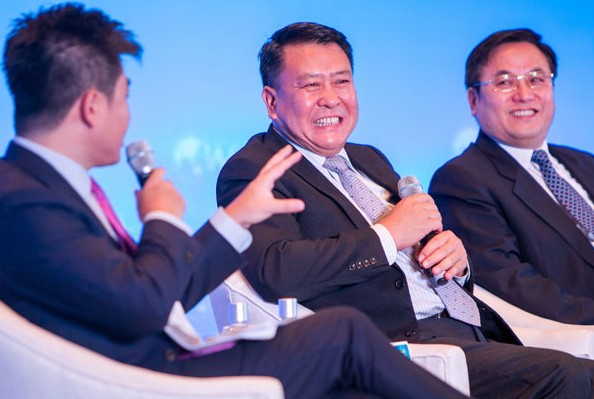

Xu Heyi (center), chairman of Beijing Automotive Group, and Zhu Fushou (right), general manager of Dongfeng Motor Corp, discuss the industry on April 8 at the annual Boao Forum for Asia. Wu Jun / for China Daily
Industry leaders point to growth and urbanization
Despite reports to the contrary, China's auto industry is not facing overcapacity as sales soar and Chinese companies continue on a steady path of internationalization, said industry insiders on Tuesday.
China's urbanization process will create huge demand in the housing and auto sectors, which will lead to higher growth in the number of vehicles on the road in the coming years, said Xu Heyi, chairman of Beijing Automotive Group Co, during 2014 Boao Forum for Asia.[Special coverage]
"The urbanization rate in China is under 50 percent, which is low compared with developed countries," he said. "So there is not an overcapacity issue in China's automobile industry."
Cars are owned by just 7 out of 100 people in the country, still far behind the global average, said Xu.
In 2013, China produced 22.11 million vehicles, according to data from the China Association of Automobile Manufacturers.
Vehicle sales in the last year grew 13.9 percent to just under 22 million, following slowing year-on-year growth of below 5 percent in the previous two years, according to the association.
"China's automobile output and sales will reach 30 million to 35 million annually at a peak in the future," said Xu.
"China's auto industry has not been fully involved in the international market yet. From that perspective, it is just at the beginning stage and it is far from time to discuss overcapacity in the industry."
The association also predicts vehicle sales will grow 8 to 10 percent this year.
Zhu Fushou, general manager of Dongfeng Motor Corp, China's second-largest vehicle producer, agreed with Xu's comments, saying the current capacity utilization rate of 84 percent in China's auto industry is acceptable.
"Any rate between 80 percent to 100 percent is reasonable for the industry," he said. "It will be the warning time when China's auto manufacturing capacity reaches 40 million in 2020, which will drag the capacity utilization rate down to below 70 percent."
In fact, overcapacity is a characteristic of a mature market, said Zhu.
"In recent years, the development pace of China's auto industry has surpassed the expectations of the public. It has also caused some social issues such as its impact on the environment, energy supplies and air pollution, which leads to exaggeration of the overcapacity problem in the industry," he said.
The problem in China's auto industry is structural, caused by both optimistic projections of auto demand in the market and local governments' encouraging policies to attract investment, said Zhu.
He said many auto company owners are affected by local governments when they decide when and where to expand their production plants.
"If the local governments cut their intervention, company owners will be more rational when they make investment decisions."
Global presence
On one hand, Chinese auto companies are expanding capacity and improving technologies to meet domestic demand. On the other hand, they are also making efforts to establish their brands in the global market.
As a State-owned auto producer, Beijing Automotive is not a pioneer among Chinese companies in terms of going global. But Xu said the company plans to establish seven strategic operational centers globally and frame 30 key market exploration plans in five to eight years.
There were rumors that the company is planning to acquire a high-end European or US auto brand, but Xu denied it during the forum.
But he said the company is cooperating with some US companies in Silicon Valley to develop an electronic vehicle, which will be on the market by the end of next year.
But he declined to reveal the price or type of car.
"It will be a product better than Tesla's Model S," said Xu. "I admit that Tesla and its founder Elon Musk have made their contribution by bringing innovation to the auto industry. But Tesla will not be able to become the Apple Inc of the auto industry and Elon Musk is not Steve Jobs."
Promising direction
He said in addition to the EV, the hybrid vehicle is a promising direction for the auto industry.
"We have done lots of research on hybrid vehicles and we are trying to persuade related government departments to pay more attention to this sector," he said.
Besides technology exchanges, some Chinese companies choose mergers and acquisitions to go global.
Dongfeng announced in February that it has purchased a 14.1 percent stake in French automaker PSA Peugeot Citroen for 800 million euros ($1.09 billion).
Zhu said the deal has already won approval from the Chinese government.
"We have to become international if we want to build into a global brand," he said.
The company said the partnership will enhance research and development capability along the entire value chain and strengthen overseas cooperation with a target of selling 1.5 million vehicles under the Dongfeng, Peugeot SA and Citroen brands each year starting from 2020.
In 2013, Dongfeng Motor sold 3.53 million vehicles in China, up 14.8 percent.
The company has been working toward internationalization for several years.
In late 2012, Dongfeng agreed with its Japanese partner Nissan Motor Co to locally produce premium Infiniti vehicles in a plant in Xiangyang, Hubei province.
It also signed a $1.3 billion joint venture agreement with Renault SA in December, the first production facility for the French automaker in China.
Full text of Li Keqiang‘s speech at opening ceremony of Boao Forum
2014-04-11China‘s auto industry booms amid challenges
2014-04-10Auto sales to rise by double digits in 2014
2014-03-11Auto market increases, local brands share falls in Feb
2014-03-11China auto sales down from record high
2014-03-10Auto industry put pedal to metal
2014-02-17China auto sales see double-digit growth
2014-01-10Copyright ©1999-2018
Chinanews.com. All rights reserved.
Reproduction in whole or in part without permission is prohibited.